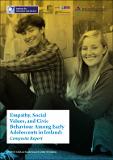| dc.contributor.author | Slike, Charlotte | |
| dc.contributor.author | Boylan, Ciara | |
| dc.contributor.author | Brady, Bernadine | |
| dc.contributor.author | Dolan, Pat | |
| dc.date.accessioned | 2020-01-15T14:49:57Z | |
| dc.date.available | 2020-01-15T14:49:57Z | |
| dc.date.issued | 2019 | |
| dc.identifier.citation | Silke, C., Boylan, C., Brady, B., & Dolan, P. (2019). ‘Empathy, Social Values and Civic Behaviour among Early Adolescents in Ireland: Composite Report.’ Galway: UNESCO Child and Family Research Centre. | en_IE |
| dc.identifier.uri | http://hdl.handle.net/10379/15706 | |
| dc.description.abstract | This new century is indeed one of pressing global issues, from climate change to
large-scale migration and displacement – issues that challenge us to exercise our
capacity for empathy, to feel for the plight of those we have never met as we do for
those with whom we share a city or a country. (Michael D. Higgins, President of
Ireland, 2016)1
Although there are many definitions available in the literature, empathy is typically understood
as a person’s ability to feel and understand the emotions and feelings of others. Empathy is
widely seen as the foundation for broader societal attitudes and behaviours, such as social
responsibility and prosocial or civic behaviour. Research has shown that empathy and related
‘other-oriented’ values and behaviours are associated with a wide range of positive outcomes in
the areas of personal development, interpersonal relationships, and societal well-being.
As highlighted in the quote by Michael D. Higgins above, we are living in an era of great social
change, where people’s capacity for empathy remains critical but can be challenged by a range
of forces or influences. The emergence of populist politics which have cultivated divisions
between groups in society could be seen as a challenge to empathic and civic values. Concerns
have been expressed that the increasing individualisation of society over recent decades is
leading to declining levels of empathy, social concern, and civic engagement among younger
generations. The accelerated advancement of information and communication technology
has raised questions as to whether increased online activity among young people will reduce
their capacity to empathise with others and change perceptions of what constitutes acceptable
behaviour. Others have disputed claims that the current generation is less empathetic than their
predecessors, arguing that young people’s civic behaviour is different from previous generations
and that technology and social media have facilitated greater social understanding between
people.
Given the importance of empathy and related social values to social cohesion and democracy,
it can be argued that it is of societal importance that values of empathy and care towards
others be given due attention in research and policy. In particular, because the empathic
or civic processes that individuals experience in childhood and youth have been found to
influence their social values and civic behaviour into adulthood, it is important to explore
these issues as they pertain to young people. To date, however, there has been little research
conducted on this topic among youth in Ireland. This study aims to generate empirical evidence regarding the values and experiences of youth
in Ireland towards a range of issues which reflect a sense of social responsibility towards others,
including an analysis of factors that influence the development of social values and empathy. It
also aims to review the degree to which national policy and curriculum supports the promotion
of such values. | en_IE |
| dc.format | application/pdf | en_IE |
| dc.language.iso | en | en_IE |
| dc.publisher | UNESCO Child and Family Research Centre, NUI Galway | en_IE |
| dc.rights | Attribution-NonCommercial-NoDerivs 3.0 Ireland | |
| dc.rights.uri | https://creativecommons.org/licenses/by-nc-nd/3.0/ie/ | |
| dc.subject | Empathy | en_IE |
| dc.subject | Social values | en_IE |
| dc.subject | Civic behaviour | en_IE |
| dc.subject | Early adolescents | en_IE |
| dc.subject | Ireland | en_IE |
| dc.title | Empathy, social values and civic behaviour among early adolescents in Ireland: Composite report | en_IE |
| dc.type | Report | en_IE |
| dc.date.updated | 2020-01-15T14:28:53Z | |
| dc.local.publishedsource | http://www.childandfamilyresearch.ie/cfrc/publications/ | en_IE |
| dc.description.peer-reviewed | non-peer-reviewed | |
| dc.internal.rssid | 16536146 | |
| dc.local.contact | Bernadine Brady, School Of Political Science, & Sociology, Nui Galway. 5759 Email: bernadine.brady@nuigalway.ie | |
| dc.local.copyrightchecked | Yes | |
| dc.local.version | PUBLISHED | |
| nui.item.downloads | 146 | |


